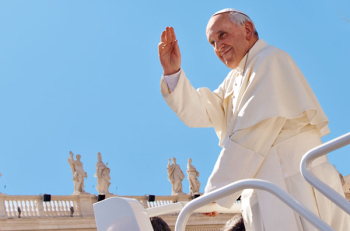The Time article accompanying Pope Francis’ award of “person of the year” is an able, constructive, accurate piece that is a nice way to sum up the state of play after nearly a year. In its construction of the story, the article effectively distinguishes between talking about “change” and talking about “priorities.” Francis is not so much changing the Church as making clear determinations about the Church’s priorities… which also means “change,” but of a certain sort.
The article makes the obligatory contrast with his “predecessors,” but not in terms of their views. Instead,
In a matter of months, Francis has elevated the healing mission of the church—the church as servant and comforter of hurting people in an often harsh world—above the doctrinal police work so important to his recent predecessors. John Paul II and Benedict XVI were professors of theology. Francis is a former janitor, nightclub bouncer, chemical technician and literature teacher.
Moreover, it strikes the right note when describing what he is doing in his focus on the poor:
The church has always made the poor a priority—a mission that has been the biting paradox of the treasure-laden Vatican. But Francis has made it clear that they are a priest’s first responsibility. “A lack of vigilance, as we know, makes the Pastor tepid; it makes him absentminded, forgetful and even impatient,” he preached in May. “It tantalizes him with the prospect of a career, the enticement of money and with compromises with a mundane spirit; it makes him lazy, turning him into an official, a state functionary, concerned with himself, with organization and structures, rather than with the true good of the People of God.”
The point here is twofold. One, it moves the issue of the poor to the front of the line, making it the sine qua non of the Church’s proclamation. It rightly requires Catholics to think through issues like abortion and the family in terms of the poor, instead of the other way around. But secondly, as the quote illustrates, there is a remarkable focus on churchmen themselves. The pope’s critiques of capitalism and wealth in Evagelii Gaudium got much attention; more overlooked was his reiteration of the crucial “no to spiritual worldliness” and a very lengthy section (40 paragraphs!) devoted directly to the importance and power of preaching rightly. The priest himself must both model holiness and speak about it rightly. The pope is saying this cannot happen if the priest himself is caught up in “worldliness,” rather than being truly caught up with Christ in the poor.
The article spends the usual time discussing the “hot-button issues”: women’s ordination, clerical celibacy, abortion, gay marriage, and remarriage. Seeing this list in condensed form should lead to some theological thinking. While the mainstream media tend to group them all together, as liberal-vs-conservative polarities, Catholic theologians know well that there is a lot of variation in the tradition’s treatment of these issues. It is not a list of yeses or nos. Putting these issues in their proper context, rather than debating about “change,” might be the best service we can provide. Moreover, it is impossible to avoid the thread that does in fact run through every one of these issues: they are about sex and gender, and (perhaps with the exception of gay marriage) are raised in particular by the achievement of women’s equality, in both work and family. By being “against” these, the Church risks being perceived as “against” that achievement. Calling for a “theology of women” is perhaps another way of signaling priorities: if the Church’s teachings on these issues is to make any sense at all, it needs an account of gender equality at least as robust as that of secular modernity… or it needs to accept the basic account of secular modernity and adjust accordingly.
A few other details are worth noting:
The article speaks briefly about his background: “The Bergoglios were very strict Catholics, the kind who worry about meeting people who were not married in the church or who were socialists or atheists. But the future Pope was never that doctrinaire.” It is often unremarked that both John Paul II and Benedict XVI, while cradle Catholics immersed in Catholic culture, also had deeply formative experiences of being embattled about the faith while young – Benedict under Nazism and John Paul II under Communism. Bergolio’s background sounds more sheltered and more stable. I think it is telling that it then produces a kind of stability that is more comfortable with ambiguity.
The pope has also experienced being disciplined and silenced by superiors: “In 1988, when he was serving as a theology lecturer at a school in Buenos Aires, he came into conflict with the provincial at the time, Father Victor Zorzín, who reassigned Bergoglio to Córdoba, more than 400 miles (640 km) northwest of Buenos Aires. From June 1990 to May 1992, according to journalist Elisabetta Piqué, author of the biography Francis: Life and Revolution, he could make no phone calls without permission, and his correspondence was ‘controlled.’ Zorzín says ‘it cost [Bergoglio] a lot to accept the change. But pain can ripen into something else.’” Perhaps analogous to his direct experience with the poor, Francis undoubtedly learned something about the exercise of ecclesiastical power by being on the other side of it. While both Benedict and John Paul held deep admiration for theologians like Henri de Lubac, who were silenced, they themselves experienced as young men at Vatican II the elation of overcoming entrenched authority by working within the system. Being on the other end of this likely makes him a bit more sensitive to its limitations.
Finally, the article calls Francis “the People’s Pope.” But that’s not right. What we have is a priest pope. “Says Father Guillermo Marcó, who was Bergoglio’s spokesman from 1998 to 2006: ‘It is the first time we have had a priest as Pope.’” I’m a theology professor, and I’ve seen enough really good, effective priests to know the difference between a professor and a pastor. I don’t think professors are bad. But I do think it is a gift to the Church that not all priests are professors.





Thank you for your article. I have just one question i would like to ask the author regarding the suggested Theology of Women. You make just passing reference to it so I am asking out of interest not to clarify something you said. As a woman, life long Catholic with a family who has also worked in the church for many years, I am having a hard time understanding why we need a Theology of Women. It seems that we need a Theology of Gender. Documents that treat women separately treat women as “other” from the rest of humanity. Those documents rarely do women justice. But gender is an issue that applies to all human persons and it is so misunderstood. Thank you for a good article.